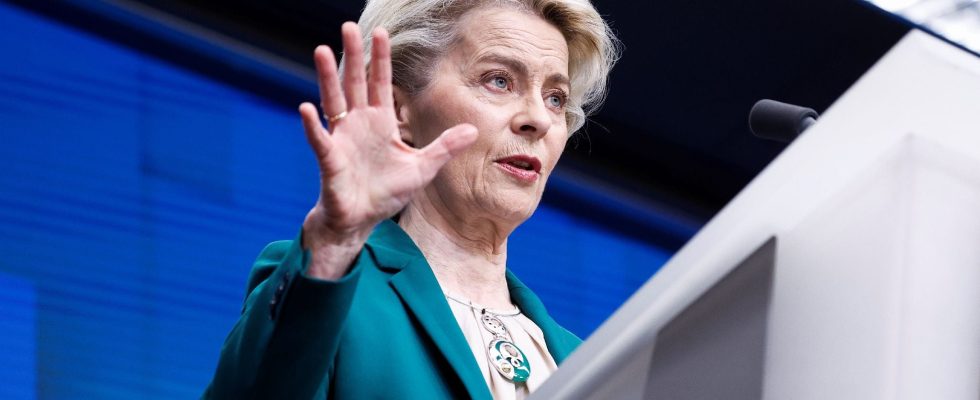The risks of a spillover of the conflict in the Middle East are intensifying, with Iran’s repeated threats against Israel, accused of being behind a strike which targeted the Iranian consulate in Damascus on April 1 , in Syria, and killing 16 people according to an NGO. After the declaration, Wednesday, April 10, of American President Joe Biden, according to which Tehran “threatens to launch a significant attack against Israel”, an American general in charge of the Middle East, Michael Erik Kurilla, is in Israel. The French Minister of Foreign Affairs, Stéphane Séjourné, for his part recommended that the French “absolutely refrain from traveling in the coming days to Iran, Lebanon, Israel and the Palestinian territories.”
Information to remember
⇒ EU sanctions Hamas for “widespread sexual violence” during October 7 attack
⇒ Norway says it is ready to recognize a Palestinian state
⇒ Iran’s threats against Israel ‘real’ and ‘credible’, says White House
EU sanctions Hamas for ‘widespread sexual violence’
The European Union announced Friday that it had sanctioned the military branches of Hamas and Islamic Jihad for “widespread sexual violence” during the October 7 attack on Israel.
Fighters from the al-Quds Brigades, the armed wing of Islamic Jihad, the Nukhba unit of Hamas and the al-Qassam Brigades, the armed wing of Hamas, “committed widespread sexual and gender-based violence, in a systematic manner, using as a weapon of war”, indicates the EU, while Hamas and Islamic Jihad are already on the list of “terrorist organizations” designated by Brussels. The EU says abuses committed by Hamas fighters include “rape and murder of minors, mutilation of corpses and genital mutilation.” She also accused the attackers of “targeted kidnapping of women and girls”. The three Palestinian entities were added to the European Union’s human rights sanctions list, which affects 104 individuals and 26 organizations from different countries.
The decision to impose these sanctions is part of an agreement between EU countries also providing for sanctions against Israeli settlers in the West Bank, accused of violence against Palestinians.
Norway says it is ready to recognize a Palestinian state
Norway said it was “ready to take a decision on the recognition of a Palestinian state”, in conjunction with other countries, Norwegian Prime Minister Jonas Gahr Støre declared this Friday in the presence of his Spanish counterpart, Pedro Sánchez, who also advocates for such recognition in Europe.
“This decision must be taken based on timing and context, in close coordination with like-minded countries. We have not set a specific timetable,” he added. The Norwegian Parliament adopted a proposal in November, tabled by the ruling parties, asking the government to be ready to recognize an independent Palestinian state.
Norway also hosted the first Israeli-Palestinian peace talks in the early 1990s which led to the Oslo Accords, in which both parties accepted peaceful coexistence between two independent states.
Humanitarian aid: opening of new access to northern Gaza, according to Israel
The Israeli army announced Friday that a new crossing point had opened with the northern Gaza Strip welcoming the first trucks of humanitarian aid to improve access to Palestinian civilians trapped in the fighting.
“The first food aid trucks entered yesterday [NDLR : jeudi] to Gaza through the new northern crossing point” located in the south of Israel, said on the Israeli body responsible for Palestinian civil affairs (Cogat). A Cogat video accompanying this message shows military vehicles and at least one truck loaded with pallets entering the Gaza Strip.
In response to requests from AFP, Israeli authorities did not reveal the number of trucks that entered on Thursday, nor the exact location of the new crossing point, which the media located near the Israeli town of Zikim, not far from Erez a crossing point currently closed.
Iran’s threats against Israel ‘real’ and ‘credible’: White House
Threats of an Iranian attack against Israel are “credible” and “real,” a White House spokesperson said this Friday, who did not want to give more details on the timing or the targets.
President Joe Biden “has been informed on multiple occasions by his national security team” and the United States intends to “do everything possible to ensure that Israel can defend itself”, also declared John Kirby, spokesperson word from the White House. “It would be imprudent not to assess our own posture in the region, to ensure that we too are properly prepared,” he said. Here too, John Kirby did not give details on possible movements of American forces in the region.
Aid to Gaza: UN wants direct hotline with Israeli army
The UN wants to be able to have a direct line of communication with the Israeli army to better understand each other and deliver aid to Gaza safely and efficiently, the humanitarian coordinator for the Palestinian territories said on Friday. Rather than interacting through liaison bodies, the United Nations and other humanitarian actors “must talk to those who fire their guns”, Jamie McGoldrick told journalists in Geneva, at the end of a three-month mission.
Speaking by videoconference from Jerusalem, he explained that “in the event of a serious security incident, we do not have a hotline” with the Israeli army (IDF). “The IDF have never worked with humanitarian actors in this type of environment. They don’t understand how we operate, they don’t understand our language and our objective. And we don’t understand their expectations.” “There is a certain level of mistrust and misunderstanding that we need to address. We want to work with them differently,” said James McGoldrick.
